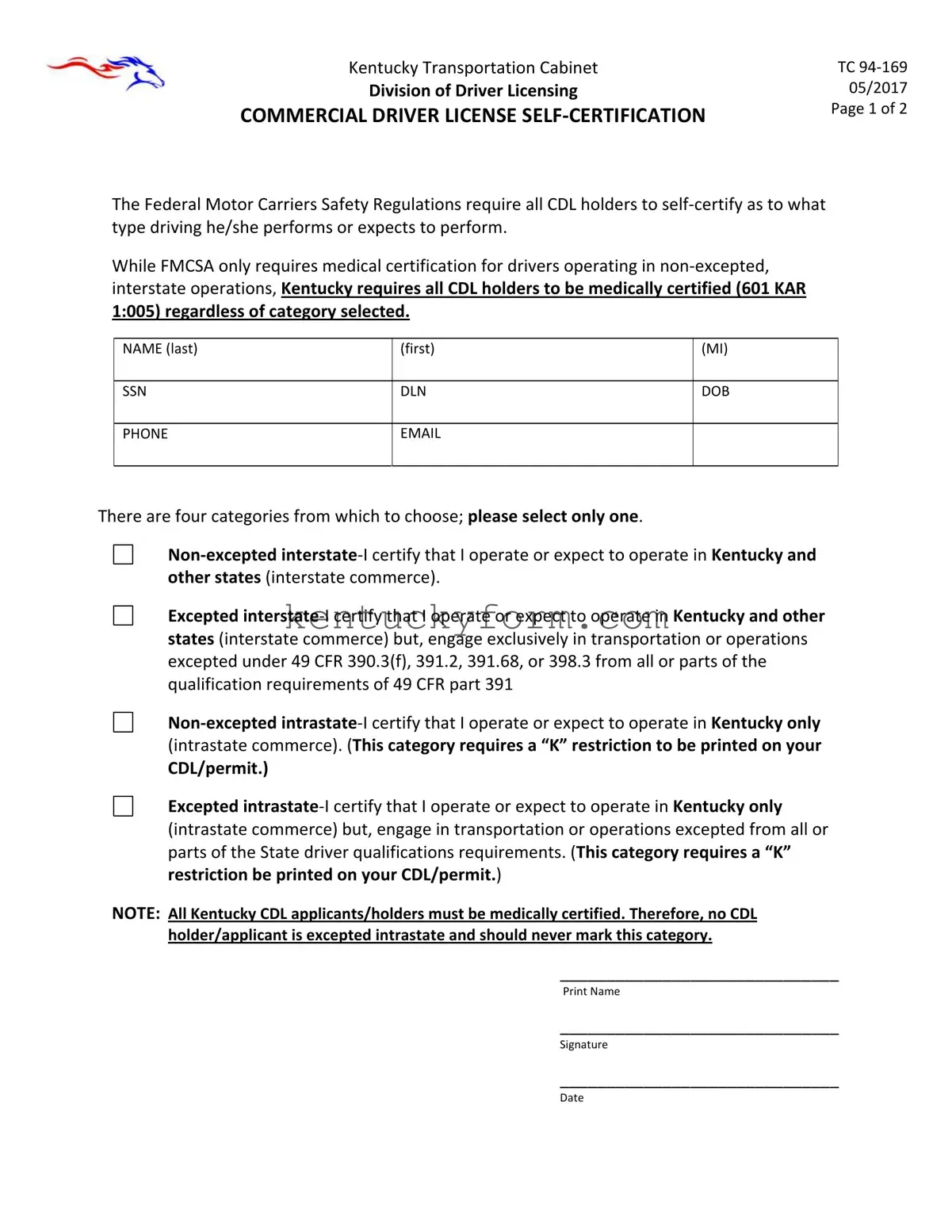Kentucky Transportation Cabinet |
TC 94‐169 |
Division of Driver Licensing |
05/2017 |
COMMERCIAL DRIVER LICENSE SELF‐CERTIFICATION |
Page 1 of 2 |
|
The Federal Motor Carriers Safety Regulations require all CDL holders to self‐certify as to what type driving he/she performs or expects to perform.
While FMCSA only requires medical certification for drivers operating in non‐excepted, interstate operations, Kentucky requires all CDL holders to be medically certified (601 KAR 1:005) regardless of category selected.
NAME (last) |
(first) |
(MI) |
|
|
|
SSN |
DLN |
DOB |
|
|
|
PHONE |
EMAIL |
|
|
|
|
There are four categories from which to choose; please select only one.
Non‐excepted interstate‐I certify that I operate or expect to operate in Kentucky and other states (interstate commerce).
Excepted interstate‐I certify that I operate or expect to operate in Kentucky and other states (interstate commerce) but, engage exclusively in transportation or operations excepted under 49 CFR 390.3(f), 391.2, 391.68, or 398.3 from all or parts of the qualification requirements of 49 CFR part 391
Non‐excepted intrastate‐I certify that I operate or expect to operate in Kentucky only (intrastate commerce). (This category requires a “K” restriction to be printed on your
CDL/permit.)
Excepted intrastate‐I certify that I operate or expect to operate in Kentucky only (intrastate commerce) but, engage in transportation or operations excepted from all or parts of the State driver qualifications requirements. (This category requires a “K” restriction be printed on your CDL/permit.)
NOTE: All Kentucky CDL applicants/holders must be medically certified. Therefore, no CDL holder/applicant is excepted intrastate and should never mark this category.
______________________________
Print Name
______________________________
Signature
______________________________
Date
Kentucky Transportation Cabinet |
TC 94‐169 |
Division of Driver Licensing |
05/2017 |
COMMERCIAL DRIVER LICENSE SELF‐CERTIFICATION |
Page 2 of 2 |
|
INTERSTATE COMMERCE:
You operate in excepted interstate commerce when you drive a CMV in interstate commerce only for the following excepted activities:
To transport school children and/or school staff between home and school;
As Federal, State or local government employees;
To transport human corpses or sick or injured persons;
Fire truck or rescue vehicle drivers during emergencies and other related activities;
Primarily in the transportation of propane winter heating fuel when responding to an emergency condition requiring immediate response such as damage to a propane gas system after a storm or flooding;
In Response to a pipeline emergency condition requiring immediate response such as a pipeline leak or rupture;
In custom harvesting on a farm or to transport farm machinery and supplies used in the custom harvesting operation to and from a farm or to transport custom harvested crops to storage or market;
Beekeeper in the seasonal transportation of bees;
Controlled and operated by a farmer, but is not a combination vehicle (power unit and
towed unit), and is used to transport agricultural products, farm machinery or farm supplies (no placardable hazardous materials) to and from a farm and within 150 air‐ miles of the farm;
As a private motor carrier of passengers for non‐business purposes ; or
To transport migrant workers.
If you answered yes to one or more of the above activities as the only operation in which you drive, you operate in excepted interstate commerce.
If you answered no to all of the above activities, you operate in non‐excepted interstate commerce. Most CDL holders who drive CMVs in interstate commerce are non‐excepted interstate commerce drivers.
If you operate in both excepted interstate commerce and non‐excepted interstate commerce, you must choose non‐excepted interstate commerce to be qualified to
operate in both types of interstate commerce.
INTRASTATE COMMERCE:
You operate in non‐excepted intrastate commerce when you drive a CMV only in intrastate commerce and are required to meet your State of licensure’s medical certification requirements. (This category requires a “K” restriction to be printed on your CDL/permit.)



